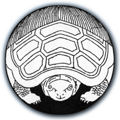It’s been just over a week, and this war has become historical fact, as inevitable as the sun that set over Baghdad last Wednesday night. And now that it has become fact, it must be paid for. We must pay $75 billion dollars for it, and that’s just the down payment. There go social services. There goes the budget for educating the next generation of American minds. I’m not being unpatriotic, but it seems to me that if you’re prepared to spend $75+ billion dollars, surely there must be a more creative way to liberate the people of Iraq, which doesn’t require killing them, and sacrificing American lives. But hey, what do I know…
In “War is a Force that Gives Us Meaning,” Chris Hedges talks about how war, once launched, creates facts, which in turn create war’s inevitability. Every death or wounding becomes a new fact that justifies, retroactively, war’s start. Every bombing or attack provides a reason to continue. Once sparked, facts become stories, stories become myths. War is a feedback loop, growing more powerful with every round of suffering. Canny aggressors throughout history have always known this and have been careful to co-opt the cuture's myth-makers. To in-bed them, as it were.
I’ve been traveling everyday to the relentless, mind-numbing soundtrack of CNN’s Orwellian war coverage, pumping through the PA systems of hotel lobbies and airline terminals across the nation. I’m glad to be moving, though. Glad to have an excuse to escape the television and to spend the evenings in the company of readers. I’m grateful to the bookstores for providing us with the space to congregate, and to everyone who comes to listen and to share. So...
Thanks to Book Passage and to A Clean Well Lighted Place for Books in San Francisco, and to Dutton’s in Los Angeles.
Thanks to The Toronto Woman’s Bookstore, Spa Ha Restaurant, Food Share, the Japanese Canadian Cultural Centre, and Polaris Institute (wow…talk about diversity!) for sponsoring a really fun evening.
Thanks to the Asian American Writers’ Workshop in New York for the on-going advocacy and support for our voices, and to Barnes & Noble at Astor Place for welcoming me home.
And here’s a little story about media and reality. The other day I had an interview at the Toronto Star. When I walked into the vast newspaper office, the largest in North America, I was amazed at how perfect it was, a seemingly endless expanse of desks and cubicles, covered with piles of paper and files and coffee cups, and reporters in shirtsleeves threading their way purposefully through the maze. I exclaimed something dumb like, "Oh gee, this is so authentic! It's exactly what a newspaper office should look like!"... at which point the journalist who was doing the interview smiled and informed me that it had been used as the location for the Washington Post pressroom in the film “All The President’s Men.”
Right.
